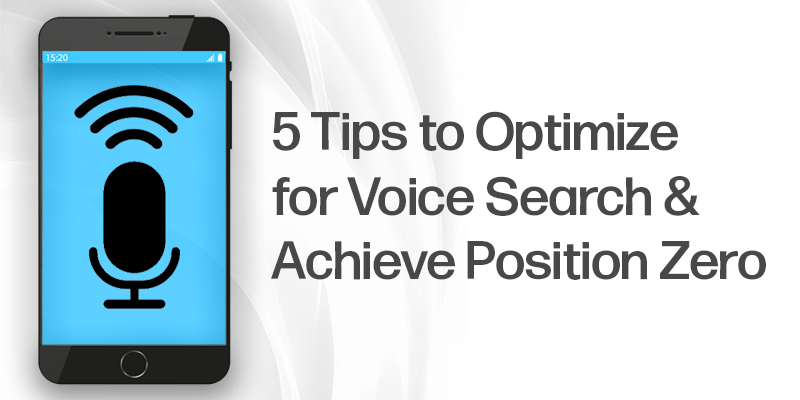5 Tips to Optimize for Voice Search and Achieve Position Zero

Voice search is one of the most important topics in the search industry today. And with good reason. It’s estimated that by 2023, the use of voice assistants will triple to 8 billion. It’s imperative that marketers optimize their content for voice search. However, success can be far harder in voice search than with regular search. Unlike regular search, in which there’s a whole page of answers for the user to choose from, voice search entails a maximum of three, which is why ranking at position zero is so important.
Position zero, also known as a Featured Snippet, is tremendously important for voice search because study after study shows that Google chooses a featured snippet for most of their voice search answers. For example, in 2019, SEMRUSH conducted a study in which they found that 70% of answers occupied a search engine results page (SERP) feature, and 60% of those were a Featured Snippet. In fact, the same study found that almost 80% of the voice search answers returned were from the top 3 organic results. One could argue that if you optimize for the featured snippet position you will also inadvertently optimize for voice search answer, and we believe this to be quite true. But, google doesn’t always choose the Feature Snippet, so we think it help to optimize for voice search specifically.
But before we start with the tips, let’s keep in mind the average voice search user and what their needs are, which may be different from someone doing a search online. Someone chooses to conduct a voice search because it’s easier and faster than typing and it allows a person to multi-task. Google understands this and so chooses the best answer that’s going to meet those needs.
Here are 5 Tips to Optimize for Voice Search and Reach Position Zero:
Tip #1: Earn Good EAT
EAT stands for expertise, authoritativeness and trustworthiness and this is exactly what Google is looking for before they suggest your answer for a voice search query. Put more simply, Google is not going to feature a new site that hasn’t been putting out quality content for a while or a site they do not trust. So the first step to any optimization for voice search is to publish quality content that satisfies your audience’s needs, which keeps them coming back for more or telling others about the fact that you exist. To learn more about EAT, visit here.
Tip #2: Write Specifically for Voice Search
This is such an important tip, that we couldn’t do it justice in just one paragraph, so we’ve written a whole blog post about it: 5 Writing Tips to Optimize for Voice Search. In a nutshell, it’s important to:
- Keep it simple
- Answer the questions inquiring minds want to know
- Make it conversational
- Use trigger words
- Go for the niche and research longtail keywords and queries.
Tip #3: Increase Page Speed
In the same SEMRUSH study I mentioned above, they also found that for the majority of the questions, the answer chosen loaded faster than the average page speed for all the other results on the SERP. Page speed is so important to Google that it’s announced a long time ago that Page Speed is a top ranking factor for desktop and mobile. They even provide a place, free of charge, to test your website called Page Speed Insights. And we couldn’t agree more with Google so we’ve already written a blog series which includes Why is Page Speed so Important and 5 Ways to Increase Page Speed.
Tip #4: Use Structured Data
Structured data is a standardized format for providing information and classifying content on that page that helps Google and other search engines understand what a page or an article is about and therefore, it is best to use structured data whenever possible to mark up content. The better the search engines are informed as to what the content is the more-likely they’ll display it to people who want to view it. Google has released a speakable structured data, but it is currently in beta. Web pages with the speakable structured data can use the Google Assistant to reach a wide range of users. In the case of Google, the assistant will return up to three articles and when it reads a selection out it mentions the source and sends a link to the article to the user on their mobile phone. Having good technical SEO supports great content. You need both to succeed.
Tip #5: Optimize for Local Search
A study by BrightLocal found that 58% of consumers have used voice search to find a local business and 46% search for a local business every day via voice search. This same study found that consumers are using voice search to make reservations, find out business prices, and to understand what products local businesses have. They also are more-likely to use voice search on businesses that are already known to them. The research is clear and the evidence is in, if you’re a local business, you need to ensure you’re optimized for voice searches.
Here are some more blog posts we thought you’d be interested in:
- 5 Writing Tips to Optimize for Voice Search
- Why is Page Speed so Important
- 5 Ways to Increase Page Speed
- Optimize for Local with Google My Business
Voice search isn’t rocket science, but it’s also not easy. We’re here to help. Contact us today.
